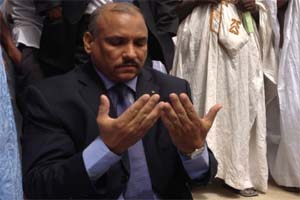Mauritania has been witnessing a wave of mounting protests calling for the toppling of the military regime. According to the opposition[ar], the military rule is against the existence of an institutional state in addition to its attempts to tame justice.
Meanwhile, the head of the Mauritanian Supreme Court, Seyid Ould Ghailani, has rejected the decision discharging him from his duty before the end of his mandate. Ghailani, who has been in his post for two years, considered this decree as a coup against justice and an outrageous interference in the work of the judicial power by the executive one. Ghailani also revealed that the Mauritanian President General Mohamed Ould Abdel Aziz has offered him a post an ambassador to Yemen. That proposal was met with refusal, with Ghailani informing the president he was remaining in his job until the end of his mandate in three years.
He also said all attempts by the executive power to undermine the powers of the judiciary are refused and do not fulfill the interest of the people or the state or the regime.
The sacking was met with indignation by lawyers in the country as well as political powers in Mauritania. In a Press conference, the Coordination Committee of the Opposition said [ar]:
إن ما أقدم عليه الرئيس الموريتاني محمد ولد عبد العزيز من إقالة لرئيس المحكمة العليا قبل انتهاء مأموريته يعد خرقا سافرا للدستور، وإخلالا بمبدأ فصل السلطات، وحنثا لليمين التي أداها رئيس الدولة”. “إن إقالة رئيس المحكمة العليا رغم رفضه الاستقالة وتمسكه بصيانة القضاء يعد إجهازا حقيقيا من طرف أعلى هرم في السلطة لما تبقى “شكليا من مؤسسات الدولة، وبرهان على أن ادعاء الديمقراطية ادعاء وهمي، وأن حكم الفرد لايزال هو السائد في موريتانيا، ولايزال الاستبداد متحكما ومسيطرا على القرارات”.
What Mauritanian President Mohamed Ould Abdel Aziz did by removing the head of the supreme court prior to the end of his mandate is an outrageous transgression against the constitution and a violation of the principle of powers separation and a breach to the president's oath. The dismissal of the head of the supreme court despite his refusal to resign and his persistence to preserve the judiciary is considered a true elimination by the highest rank in power to what formally remains from the state's institutions and a proof that this pretense of democracy is just a fallacious allegation and that the ruling of the individual is still prevailing in Mauritania and and that tyranny is still dominating all decisions.
In its turn, the national board of lawyers denounced the act of security forces preventing Ghailani from entering his office in Nouakchott and exercising his function and considered the decision as a coup against justice. The dismissal case is not the first story to spark a problem in the Mauritanian judiciary since the former minister of Justice also fired one of the judges [ar], a matter which was decried by the judiciary and political milieu.

” Photo of the sacked head of supreme court, from the blog ” “May you Wake up on a nation” تصبحون على وطن
Commenting the case, writer and blogger Mohammed Al Amin Ould El Vadel said:
إن هذا القرار ذكرني تلقائيا، وبتلقائية قد لا تكون بريئة، إن كانت هناك أصلا تلقائية غير بريئة، بقرار إقالة القاضي”افتخار شوردي” رئيس المحكمة في باكستان في عهد الجنرال “برويز مشرف”، والذي أثار قرار إقالته حراكا واسعا في باكستان، أدى في النهاية إلى استقالة الجنرال “برويز مشرف” من رئاسة باكستان، في يوم 18 أغسطس 2008، أي قبل انقلاب “ولد عبد العزيز” بأيام معدودة.
This decision reminded me spontaneously in a spontaneity that might not be that innocent of the decision to dismiss judge Iftikhar Chourdy head of the court in Pakistan during the rule of General Pervez Musharraf in Pakistan and which stirred a large movement of opposition in the country and eventually led to General Musharraf resigning from the presidency of Pakistan in August 18, 2008, i.e just a few days before the coup of Ould Abdel Aziz
Mauritanian Activist Taha Al Hafedh tweeted intensively about this issue:
@TahaAlhafedhفهم عزيز للديموقراطيه سطحي, فهي تعني مؤسسات وسلطات ثلاث لايحق لهم التدخل في عمل بعضهم وهذا ما لم يفي به عندما أقال ولد الغيلاني!
The understanding of Abdel Aziz of democracy is superficial for democracy means institutions and three powers which cannot interfere with each other's functions and that is something he didn't abide by dismissing Ould Al Ghailani
@TahaAlhafedhولكن إذا كنا نتحدث عن دولة الجنرال فتصرف من قبيل إقالة رئيس المحكمة العليا يصبح أمر طبيعي وعادي لأننا لا نتحدث عن دولة مؤسسات
But If we are talking about the state of the General then such a behavior becomes natural and ordinary because we are not speaking about a state of institutions
For his part, Mejd Ahmed also tweeted:
@mejdmr رئيس المحكمة العليا المعين كان محاميا للسنوسي وحضر اعتصام المحامين للتضامن مع الرئيس “المقال تعسفا” يوم أمس قبل تعيينه في مكانه.
The head of the supreme court was a lawyer to Sennousi and he attended the sit in of the lawyers in solidarity with the president dismissed unfairly yesterday before being appointed instead of him
Activist Ahmed Salem added:
@Sirius_MR السيد ولد الغيلاني لم يكن يوما محببا من القضاة أو من المحامين … تضامنهم معه نصرة للقانون ولأنفسهم لا لشخص السيد !
Seyid Ould Ghailani was never loved by Judges or by lawyers. Their solidarity with him is a victory for the law and for themselves and not for his own person.
Bab Ould also couldn't remain silent on the issue. He tweeted:
@babadeye بعد عسكرة المؤسسات التعليمية، الجنرال عزيز يبدأ هذا الصباح بعسكرة المؤسسات القضائية.
After the militarization of educational institutions, General Aziz is starting this morning to militarize the judiciary.
@babadeye الجنرال عزيز لم يسلط الله عليه أسوء من نفسه،فهو يخلق المشاكل لنفسه بنفسه كل يوم،لقد حول ولد الغيلاني من صديق إلي عدو وجعله بطلا.
God hasn't put a worst enemy to General Aziz than himself. He creates problems for himself everyday. He transformed Ould Al Ghailani from a friend to an feud and made him a hero.







